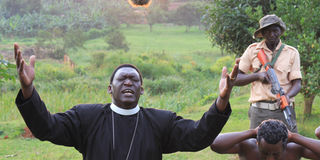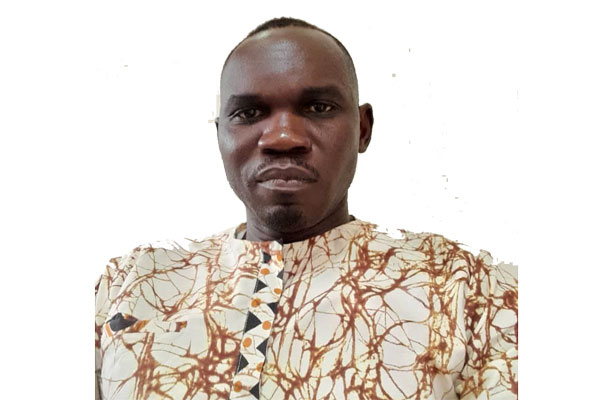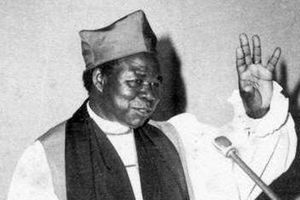
Veteran actor Peter Odeke portrays Janani Luwum. PHOTOs/courtesy
Let us look at it this way, how many Ugandan centred biopics do exist?
There are multiple with the character of Idi Amin, much as they are all inspired by real events; some, such as The Last King of Scotland, are fiction written around real events, although the characters of Dr Garrigan, for instance, are totally made up; even some of the film characters never existed in Amin’s life.
Then there was Queen of Katwe, the biopic about the life of a chess player, Phiona Muteesi. The film made roughly Shs180 million, while screening in Uganda and is one of the most successful films in Uganda’s cinematic history. Yet, if there is one thing both Queen of Katwe and The Last King of Scotland have in common, it is the fact that they are both Hollywood films about local subjects.
Very few local filmmakers have warmed up to the idea of making biopics about local icons such as Ham Mukasa, have polarising stories and escapades, or John Aki Bua’s heroics. In fact, save for Ashiraf Ssemwogerere’s efforts with Mukajanga, a film about Buganda’s prime minister at the time the Uganda Martyrs were killed, there are few biopics that are known in Uganda by Ugandans.
Most of the would-be local biopics have largely remained on writing pads and have not really taken off. For example, Usama Mukwaya’s attempt at Philly Lutaaya’s biopic or Dan Fabrizio’s collaborative effort with Ugandans to make a film on the life of Kefa Sempangi. This was in such advanced stages that a funder teaser and a working title, The Distant Grief, were even ready. However, even when one of Kefa’s children, Elleanor Nansibo, is a prominent local filmmaker, this particular film was delayed and probably abandoned.
It is hard to categorise Kony Order From Above, the film had a Kony character who was barely called by his name throughout the film. It remained hard to salvage whether the film was about the warlord or about his army, with him in absentia.

Matt Bish (centre) the director, poses with Alele and Odeke on the set of the film. PHOTOs/courtesy
Which makes Janani: The Last Stand, such a big deal. The film, which is one of UCC’s content support recipients, follows Janani Luwum during the turbulent times of Amin’s regime. During those dark days, most Ugandans lived in fear and dared not stand up against the dictator, and those who tried it, disappeared, never to be seen again.
But then there was Janani Luwum, who single-handedly stood up against this dictatorship regime and spoke at every opportunity given to him, even when people around him kept on disappearing. His faith was the only required defense. With this, he went places that no man dared go to, and he earned his respect. Idi Amin was terrified of him.
That is according to the synopsis; the film is a step in the right direction, especially now, when many Africans are opting to have fellow Africans tell stories about their legends and warriors.
This film is Matt Bish’s big return to feature films after years of directing documentary films, and this is the director revisiting a topic that made him a household name with the State Research Bureau, Uganda, under Idi Amin’s tyranny.
However, Bish says the State Research Bureau was not necessarily set in Amin’s regime, but in the mid1980s. “In this particular film, we (Matt and Catherine Bish) wanted to tell the story of two people who are going for each other’s neck, and there was not a better story than The Last Stand. Janani took a stand. I look at stories that can create a wave. This story is unique; it has two figures, the archbishop was Bishop of Uganda, Rwanda, and Zaire, and he has a statue at the cathedral of Canterbury,” he says.

Sayub Alele portraying Idi Amin in Janani The Last Stand. PHOTOs/courtesy
Bish says the film is a fiction story inspired by real life events, but there will be a sense of being factual. He says he intends to have Janani and Amin portrayed well. “We love telling stories of people who have shaped Uganda; many young people hear the name, but do not know what they stood for. We need to document such figures for audiences to learn,” he says.
When the film was first announced almost a year ago, Bish had shot bits of it, and there was a ready trailer that starred Patrick ‘Salvador’ Idringi and Prynce Joel Okuyo. The concept trailer shows a tortured Okuyo as Janani telling Amin, who is played by Salvador, that if he needed to see him, he could have called.
However, last week, Bish shared a poster for the film. As much as the public was elated, this was different. Actor Peter Odeke had replaced Prynce Okuyo as Janani, while Sayub Alele had replaced Salvador as Amin. Bish says the teaser was initially shot to solicit funds and he had hoped to work with both actors. Unfortunately, they had moved on to other things by the time production took off.
Janani Jakaliya Luwum was archbishop of the Church of Uganda from 1974 to 1977 and one of the most influential leaders of the modern church in Africa. He was arrested in February 1977 and died shortly after. It is generally accepted that he was murdered on the orders of then-President Idi Amin.
The film wrapped up production last month after shooting for 16 days. Matt Bish says the film will hit the big screen in October.
About the producer
This film is Matt Bish’s big return to feature films after years of directing documentary films. The director revisits a topic that made him a household name with the State Research Bureau, Uganda, under Idi Amin’s tyranny. Bish says the film is a fiction story inspired by real life events, but there will be a sense of being factual.




